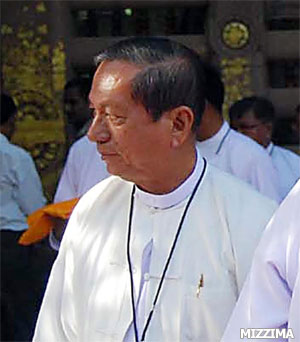Chiang Mai (Mizzima) – The Mong La group will be allowed to reopen its liaison offices following peace talks held on Saturday with a Union-level peace delegation led by Union Solidarity and Development Party (USDP) Secretary Aung Thaung.

Since 2009, the government has demanded the transformation of Mong La forces into a Border Guard Force, but during the peace talks the matter was not discussed, said Mong La delegates.
“Both sides held discussions on cooperation in reopening of liaison offices, reassignment of staff for ensuring better education, health, agriculture and transport in Special Region (4) and the elimination of illegal narcotic drugs, and signed agreements,” the state-run newspaper New Light of Myanmar reported on Tuesday.
The peace talks were held in Shan State Special Region (4). According to the newspaper, the meeting at the headquarters of the Triangle Regional Military Command in Kengtung was attended by a Mong La delegation led by Vice Chairman San Pae, with 10 delegates on each side.
The government delegation included the chairman of the National Race Affairs and Internal Peace-making Committee, Thein Zaw; the Shan State Chief Minister Sai Aung Myat; Shan State Security and Border Affairs Minister Colonel Aung Thu; and the Shat State Advocate General Maung Maung, according to the Sino-Burmese observer Aung Kyaw Zaw, who is close to the Mong La group.
Prior to the peace talks, government delegates including Aung Thaung and Thein Zaw and the Mong La group’s delegates held an initial meeting in Kengtung, in which issues including a cease-fire and regional development were discussed. The government specified that the initial meeting was a regional level meeting.
During a 10-year cease-fire period, which was broken in 2009, there were more than 100 government civil servants including agricultural workers, doctors and teachers in the Mong La headquarters. The cease-fire was broken because of the former junta’s order to transform the Mong La group into a Border Guard Force, and the junta ordered civil servants to leave the area.
The National Democratic Alliance Army-Eastern Shan State, aka Mong La group, comprises Shan, Palaung and Akha people. It has an estimated 3,000 soldiers and its area has been specified as Special Region 4. The Mong La group is active in Kengtung District, Mong Yawng, Mong Hpayak Township, and on a section of the Mekong River near Burma’s border with China and Laos.
In accordance with another agreement, Special Region 4 area will remain restricted and Mong La troops will be required to inform authorities in advance if they want to cross into other areas.
The state-run newspaper reported on Tuesday that the Mong La group said that it would never secede from the Union and oppose the State.
The Burmese government is also engaged in peace talks with the United Wa State Army (UWSA). Recently, a government delegation led by Aung Thaung and Thein Zaw met with the UWSA on two occasions.
The 2008 Constitution says that the Union Defence Services is the sole defence force in the country. The former junta’s efforts to force ethnic armed groups to transform themselves into a Border Guard Force or people’s militia to be operated under the Defense Services was rejected by most ethnic armed groups.
Since previous cease-fires with ethnic armed groups were broken, the government has fought against the Kachin Independence Organization, the Shan State Army-North and the Democratic Karen Buddhist Association.



